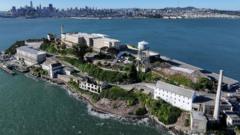Amid speculations surrounding President Donald Trump’s proposal to reopen Alcatraz Island, experts have cast considerable doubts on its viability. Referred to notoriously in American history, Alcatraz serves as a grim reminder of the penal system's past. Today, the iconic island is primarily a tourist destination, drawing over 1.4 million visitors annually. However, Trump has indicated his ambition to transform it back into a functioning prison capable of housing violent offenders.
Trump publicly announced his intentions via Truth Social, reflecting on the urgent need for "law and order" in America. While he acknowledges Alcatraz's dilapidated state, he suggests reopening it could symbolize stringent law enforcement. In press conferences, Trump stated, "Alcatraz represents something very strong, very powerful," and indicated that some in his administration would explore the possibility of revamping this historical site.
Despite the grandeur of Trump’s vision, experts and historians have raised serious objections. Hugh Hurwitz, former acting director of the Federal Bureau of Prisons, described the feasibility of reopening Alcatraz as unrealistic, noting the severe deterioration of the facilities. Challenges include outdated infrastructure that lacks necessary security features and basic amenities, such as water and sewage, which would be cost-prohibitive to modernize.
Jolene Babyak, an Alcatraz historian, highlighted that the logistics of waste management from the site alone present a daunting obstacle, stressing that the notion of reopening Alcatraz is impractical based on the required repairs, cost, and maintenance. With estimates indicating that operating costs would far surpass current federal prison expenses, many see the proposal as not only extravagant but also unworkable.
Critics assert that the historic value of Alcatraz as a national landmark should not be overlooked amid political rhetoric. The National Park Service currently protects the site, and its preservation efforts reflect a commitment to American history rather than a return to its role as a prison. As the debate continues, the divide between Trump’s vision and expert opinions underscores the complexities of historical conservation and penal reform.
In conversations about the future of Alcatraz, its storied past as a military fortress turned maximum-security penitentiary remains an evocative symbol — while its potential revival as a prison illustrates an ongoing struggle between the aspirations of political leaders and the realities dictated by history and structural limitations.





















